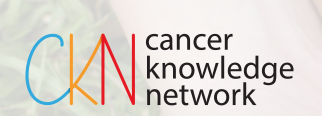
AYAs: Make Your Voice Heard
 For some ideas on how to advocate for yourself and other young people going through cancer treatment and survivorship, check out my new post on Cancer Knowledge Network's website by clicking the link below! AYAs: Make Your Voice Heard
1 Comment
Chronic pain is something I don't think I have written about before, but it is definitely something I have had to figure out how to deal with. Chronic pain is persistent, long-lasting pain and it can really affect your daily life. In recent years, since beginning to work in the field of psycho-oncology, I have learned more and more about how common chronic pain is in young cancer patients and survivors. Research has show that 20-30% of adult survivors of childhood cancer who are 10 years and 14 years post-diagnosis report pain of some kind of pain (Lu et. al, 2011). Whether it’s because of surgery, neuropathy (a side effect of chemotherapies like Vincristine), or other issues, like back problems (something I deal with because of the number of spinal taps with chemo that I received), you may find chronic pain follows you during and after cancer treatment. I find it interesting that if chronic pain is something so unavoidable for young people that go through cancer treatment, I just wonder why it isn’t talked about more? I certainly was never warned about it. Like everything else that I have felt doesn’t get talked about enough, I’m going to try and talk about it here. Being prepared and knowing what you can do to manage pain is so important. There are many things you can try other than just pills to manage pain. I recently listened to a presentation by a researcher from Stanford who studies pain in young people with cancer. She recommended this interesting video as a starting point to understand what causes us to feel pain and what pain really means: The video ends with a series of questions to ask your doctor, to find out more about your pain and how to cope with it. It is also important to know that most major hospitals will have psychologists working directly in pediatric or adult oncology that could also help you with coping with pain. Alternatively, your doctor might be able to connect you with a psychologist who specializes in coping with pain at your hospital. If you are interested in seeking out such specialists yourself, good places to look are the websites of major hospitals (particularly ones connected to a big university) since these will be the places where doctors and mental health practitioners, like psychologists or psychiatrists, tend to work more closely together to do pain research. If they are doing pain research, it means they will likely be more aware of the latest and greatest methods available to help you manage pain. You’ll want to look for a place that provides what is called a “multi-disciplinary approach” or involves an "interdisciplinary team," which means they bring together lots of different specialists to give you access to a wide range of potential pain management strategies. You can view the Johns Hopkins Pain Treatment Program or the Blaustein Pain Treatment Center at Johns Hopkins for examples of what types of programs to look for. Essentially, there are 3 steps to take to begin to work towards coping with chronic pain during or after cancer treatment: 1) Understand what is causing your pain.
I appreciate the end of the “Tame the Beast” video, when the narrator says it is important not to give up hope. Managing pain as a cancer patient or survivor is a lot like managing a diagnosis of cancer. Like cancer, chronic pain is not something you expect to deal with at a young age. To get through both a cancer diagnosis and the onset of chronic pain, you have to stay positive, be persistent, and never give up hope that it will, somehow, all work out. If you have gotten through diagnosis (which you likely have, if pain is an issue you are dealing with), it means you already have the positivity, persistence, and hope you need. You may just have to put all of that energy towards a different purpose, to find ways to manage and cope with any pain that you experience. References: Lu, Q., Krull, K. R., Leisenring, W., Owen, J. E., Kawashima, T., Tsao, J. C. I., … Zeltzer, L. K. (2011). Pain in Long-Term Adult Survivors of Childhood Cancers and Their Siblings: A Report from the Childhood Cancer Survivor Study. Pain, 152(11), 2616–2624. http://doi.org/10.1016/j.pain.2011.08.006 In December, I was fortunate to find my dream job and began working as a research assistant with the Behavioural Sciences Unit, proudly supported by the Kids with Cancer Foundation, in the Kids Cancer Centre, at Sydney Children's Hospital. I am honored to be a part of such an incredible group of researchers who are doing outstanding work to address the needs of and challenges faced by children, teen, and young adult cancer patients, survivors, and their families. I was especially honored to have the opportunity to write a blog post for the BSU's website about my personal experiences with cancer. You can find the post, and learn more about the BSU, here.
It’s been awhile since my last post but I’m excited to announce that the delay was because I have officially moved to Sydney, Australia! So, Riding the Cancer Coaster is now coming to you from the land down under! I wanted to take this post to share some resources that I have come across in the past few weeks. Here’s a list of 10 great resources for for AYA cancer patients and survivors (not listed in order of helpfulness/importance or anything like that - just a set of 10 helpful resources):
 A big misconception among adolescent and young adult (AYA) cancer patients and survivors is that doctors are authority figures not to be argued with. This is especially an issue for younger AYAs. I know it was a particularly inhibiting problem for me, as it led me to not take action when problems arose and, if any action was taken, it was because my parents stepped up to negotiate with my doctors. So, I wanted to take this post to talk about the next key pillar of being a self-advocate: negotiation skills. You may be most familiar with negotiation skills related to business and commerce. But, negotiation skills can be used in any setting where you want to get the best outcome for yourself. I found a great article in the Washington Post that talks about negotiation skills. Author Joyce Russell outlines key components of negotiation, as told to her in interviews with senior executives in her region. First, she talks about a win-win style of negotiation. This is mostly relevant for business negotiation where it’s helpful for both groups involved to benefit at the end of the negotiation. In our cancer care case, this is less important. But, you could say that an outcome in which your doctor and you are both pleased is a “win-win” and may be beneficial. The next components discussed by Joyce are the following:
Let’s think about how this would look in an appointment with your oncologist. One of the biggest problems that arose when I went through my relapse treatment was that I had a spinal tap done in the first month of my treatment which led to a 26-day-long spinal headache. Because I had had around 20 spinal taps during my initial treatment as a toddler, I had developed a great deal of scar tissue in the area of the spine where spinal taps are typically done. The physician assistant who did the tap (thankfully I was under anesthesia) took over 13 attempts (pokes with the spinal tap needle) before finally giving up and asking another PA to do it. The other PA moved up another level in my spine and was in instantly. But, the chemo that was then injected proceeded to make the 13 tiny pokes into a single, relatively large hole. And so proceeded the most debilitating experience of my life. Increases in Oxycodone dosing, lying flat for weeks, caffeine tablets...nothing worked to fix it and it got to a point where I stopped eating and was only vomiting from the pain. My vision was becoming blurry and my body growing weak. Only after my mom drove me to the emergency room and demanded my oncologists consult with a pain management specialist about a solution she had found online (called an epidural blood patch) did the oncologists finally reach out of their bubble to get me some help. I was somewhat guilty in all of this though because I tried to smile and agree with the oncologists’ courses of action during each appointment in which they asked me about how I was doing and how back my headache was. Retrospectively, I wish I had negotiated with them to take action sooner and get creative. If you find yourself displeased with a course of action taken by your oncologists, or a lack of action taken by them, you have every right to negotiate. Thinking back to my example:
You are in the driver’s seat when it comes to your health. If you don’t like what is happening with your care, or if there is a lack of action related to an issue that’s important to you, advocate for improvement by negotiating until you receive an outcome acceptable to you. For questions about this post or about my book/website, feel free to contact me at [email protected].  If you want to take greater ownership of your care, problem-solving skills can help you to think through challenges or setbacks you are encountering. Problem-solving skills are a little bit more tricky to talk about because, personally, I feel like problem-solving is more of a process you have to know how to go through, rather than a specific set of skills. This is also one of the more complex aspects of being a self-advocate because the process of solving a problem involves using information-seeking and communication skills. If you have not read my posts about those sets of skills, I recommend you start with those before reading this post. So, to help you become a problem-solver, I will start with this flowchart I found to be really helpful. While this process may seem very detailed, I have found it helpful because it breaks things down into a more manageable process, and enables me to reflect on problems from different perspectives.
Let's walk through this process:
Part 2: What parts of my health are those inpatient doctors responsible for? Part 3: Why am I uncomfortable communicating with the doctors I see when I am inpatient?
If I don not know the answer to this, I can ask those doctors directly, I can ask my nurse, or I can ask my parent/guardian. I can also do some research online to better understand what doctors come on inpatient rounds and what roles they play in caring for patients. From asking people or from researching online, I can learn that the doctors I see when I am inpatient possess a range of skills. I likely will be visited by one attending oncologist, who is in charge of caring for all the patients on the inpatient floor. He/she will possibly bring with him/her an oncology fellow (a doctor who is specializing in oncology and training to become an attending doctor), a few residents (doctors in training - below the fellow in the doctor hierarchy), and maybe also some medical students (students who are studying to become doctors). Part 2: What parts of my health are those inpatient doctors responsible for? Again, I can ask people around me about this, or I can take to the internet. In asking around or doing research online, I would learn that the attending doctor is in charge of managing all aspects of my cancer care while I am inpatient. He/she is therefore responsible for all aspects of my health while I am under his/her care. This means that I can ask this doctor any questions, or bring up any concerns - whether they are directly related to my treatment or not. The fellow, residents, or medical students that the attending may bring along on rounds could also answer questions I have, but may be less knowledgeable about the details of my case, and may have less experience, so I should probably direct my questions or concerns to the attending if I have the opportunity. Part 3: Why am I uncomfortable communicating with the doctors I see when I am inpatient? This is one I can just think through. I seem to feel uncomfortable communicating with these doctors for a few different reasons. First, when they come into my hospital room, I have trouble understanding who they all are and what their roles are. Second, it is difficult to tell who to ask when I have questions. Third, I feel like they are authority figures and that if they make decisions about my care, they know what is best and I do not need to question it.
To recap: Start with defining what your problem is and then gather any information you have about your problem. Gathering information can include brainstorming and coming up with questions related to your problem. Next, break down your problem into smaller, more manageable, pieces. Once your problem is broken down, you are dealing with more specific, smaller issues for which it’s easier to identify solutions. After you have identified solutions to the various pieces of your problem, you can select the best solution(s). Examine the results of your chosen solution(s). Test out your chosen solution(s) and review whether they worked or not. If they worked, great. If not, try going back to your original problem, breaking it down again into more/different parts, and identifying other possible solutions you can try. Whether you like to write things down as you go through these steps, or talk through these steps with someone, problem-solving can take time so be patient with yourself and be open to having to try out multiple different solutions. You can read more about this process, and find other information about problem- solving skills, on the University of Kent website.
 “Your communication skills can be applied to thoughtful interactions with your family, friends and caregivers, thereby increasing your knowledge and avoiding unnecessary misunderstandings.” -National Coalition for Cancer Survivorship Communicating with your healthcare team can be one of the most difficult parts of adjusting to cancer treatment or survivorship as teens or young adults. As children or young teenagers, you get used to having your parents be the ones to pay attention to the details for you, stand up for you when necessary, and ask questions when things get confusing. However, as older teens and young adults, you begin to understand more about your health and this can lead to the challenging situation of wanting to take greater control of it but not knowing where to start. When I was diagnosed with my relapse at 13 years old, I had learned enough biology and chemistry in school to understand the explanation the doctors provided me with regarding what my cancer was and how it would be treated. However, I had not yet developed the communication skills to know what to say or when to ask questions in my appointments. When do I talk to my fellow? What kind of questions do I ask him versus my nurse? What is the difference in the role of the physician assistant I so often saw in the outpatient center and the fellow who seemed to be in charge of my case? And how on earth do I speak up in front of a room full of medical students and residents who, even if they don't intend to, look at me and talk about me in a way that makes me feel like I am part of some kind of zoo tour? I mean, when you're a 13 year old girl with ragged hair falling out, almost no eyebrows left, hooked up to all kinds of things that make you feel like your body is rebelling against you, and are then woken at 8 am to the knock of a pile of 20-30 somethings who are dressed in professional attire with notebooks in hand, ready to discuss your bowel movements…...it just isn't conducive to comfortable conversation and communication. Instead of trying to get answers, I just muddled along until the answers arose or until the situation went away. I only asked questions when I was in an outpatient appointment with the fellow I knew was in charge of my case, and I otherwise let my mom do all the talking. But, I regret that, because I let myself think that all those people in the hospital were in control, and I did not take ownership of my own health. Being able to take ownership of your health means it's necessary to learn how to effectively communicate with everyone involved in your care. To develop communication skills, I think the most important place to start is in recognizing you are in charge, and your healthcare team is just there to provide support, advice, and guidance to you. In addition to remembering you are the one in charge, there are concrete things you can do to communicate more effectively. I found a really helpful outline on WikiHow about how to develop good communication skills: http://www.wikihow.com/Develop-Good-Communication-Skills The outline includes several in-depth descriptions of different aspects of communication, but my favorite part of it is their 10-second summary of how to develop good communication skills.
I'll elaborate a little on what this means for AYAs in treatment or survivorship:
Using these tactics and remembering you are in charge of your health may help you take steps towards improving your communication with your healthcare team. This, in turn, can help you maintain greater ownership over your health and care.  Following last week’s post, I’m going to start tackling this self-advocacy puzzle by writing about the first of the 4 sets of skills the National Coalition for Cancer Survivorship outlines as necessary to be a self-advocate: information-seeking skills. In thinking about information-seeking skills from a teen/young adult perspective, I think the biggest barrier to developing good information-seeking skills is simply the availability and accessibility of information. If you don’t have the information readily available to you, and/or you don’t have an easy/understandable way to access it, it can next to impossible to know what to do. That is, after all, why I started this website and wrote my book: the information I wanted was not available or accessible to me. That being said, I have learned a lot about seeking information since I started this blog about 6 years ago. And, for our age group, it's still unlikely the information you want will be handed directly to you. So, I want to share my biggest tips and tricks with you to equip you with the knowledge to be a better information-seeker. Disclaimer: These are all suggestions based on my personal experience with seeking information for myself, blog, and my book...this is not professional advice. To me, the most important place to start when seeking information is with defining what information you are looking for. We are used to just plugging things into Google when we want answers, but when it comes to health research, it can be useful to follow a bit more of a specific process. Step 1: Define what information you want. I like to turn the topic into a list of key words/phrases. Be as specific as possible.
This brings us to Step 2: Use the internet **very carefully**. I compiled almost everything I have written about on this website and in my book from online research. So, the information you want is out there, but you must know where to look, and it is critical to understand what are reliable sources of information. This is where the **very carefully** comes into play.
Step 3: Use the most recent information you can find.
Finally, we come to Step 4: Developing your resource portfolio.
The reason I have found information-seeking skills to be so helpful is because they can increase your self-confidence. When you go into doctor’s appointments or meetings with health providers, and you are armed with the knowledge about your condition, you are better equipped to ask questions, and this ultimately helps you take greater control over your health and wellbeing. Long story short Information -> Knowledge -> Self-Confidence -> Owning your health and wellbeing. In a post for Cancer Knowledge Network that I wrote back in November, I talked about the challenges involved in the transition from pediatric to adult healthcare, and the need for more support and education to be provided to teens and young adults to be able to successfully get through this transition. In the last couple of months, I have gotten to wondering what, above all other obstacles, is the most important thing to help get young people to feel comfortable taking charge of their own care? After talking with some other young adult cancer survivor friends, and some friends of mine who have chronic illnesses, one topic repeatedly came up in the discussion about transitioning to adult healthcare: self-advocacy.
So, what exactly is self-advocacy? According to the National Coalition for Cancer Survivorship, self-advocacy means: “…You arm yourself with the tools and skills necessary to feel comfortable about asserting yourself and communicating clearly about your cancer care needs.” They also summarize that the skills necessary for self-advocacy include: information seeking skills, communication skills, problem-solving skills, and negotiation skills. Through further research, I also found that perspective can play a role in enabling or disabling you from successfully advocating for yourself. I came upon an article about self-advocacy by a psychologist, who is herself a cancer survivor, in the online magazine Psychology Today. One statement she made that really stood out to me said that many patients “…may find it difficult to question someone they perceive as authority figures who control their destiny. They may fear asking “dumb” questions or alienating their doctors by questioning them.” This highlights a perspective that I know, from my own experience, seems to be at the heart of helping teens and young adults become self-advocates: learning that your doctors are not controlling authority figures and that there are no “dumb” questions. To summarize, it seems there are 3 crucial pieces to this self-advocacy puzzle: (1) Developing a range of skills that enable you to feel confident in your ability to clearly communicate your needs, (2) recognizing that your doctors are not authority figures with control over your future, and (3) it’s your body and your health, so you are entitled to ask any question at all – there is no such thing as a “dumb” question. Seeing as this is a pretty complicated puzzle, I thought I’d take some time to break it down. In my next few posts, I’ll cover each of these puzzle pieces, to try to make it easier for teenage and young adult cancer patients or survivors to piece together the necessities for becoming self-advocates. For anyone searching for resources to help with the challenges of cancer treatment, one of my new favorites is Cure Magazine. Cure publishes a variety of articles – anything from scientific breakthroughs in cancer treatment to patient stories. My dad works in oncology, so subscribes to the magazine. However, you can also access all of their articles on their website: curetoday.com.
In their most recent issue, they included a special issue along with their magazine, called Medication Adherence and Financial Support. While every article in the special issue seems incredibly valuable to me, I wanted to highlight one: The Samfund Launches New Toolkit to Guide Young Adults Through Cancer-Related Financial Decisions (you can also find it on curetoday.com). The article covers a new toolkit developed by another awesome foundation (and great place to find resources), The Samfund. According to Cure's article, the toolkit is designed to be a decision-making guide to help young adults make the tough decisions involved in the financial management of cancer treatment. You can access the toolkit and other financial resources provided by The Samfund HERE. I did a test-drive of the toolkit and it is fantastic! It asks important questions to help determine what financial issues you need the most help with and it's so easy to use. After looking around for similar resources, I have not found any other tools quite like it. However, I did find a great list of financial assistance organizations on the Stupid Cancer website. You can also check out Hope for Young Adults with Cancer, The Leukemia and Lymphoma Society, or Critical Mass for additional resources! |
Archives
April 2021
Categories
All
SubscribeTo subscribe to my blog, click RSS Feed above. If you are using Google Chrome, click here and add the RSS subscription extension (by Google) in order to be able to subscribe to my blog!
|